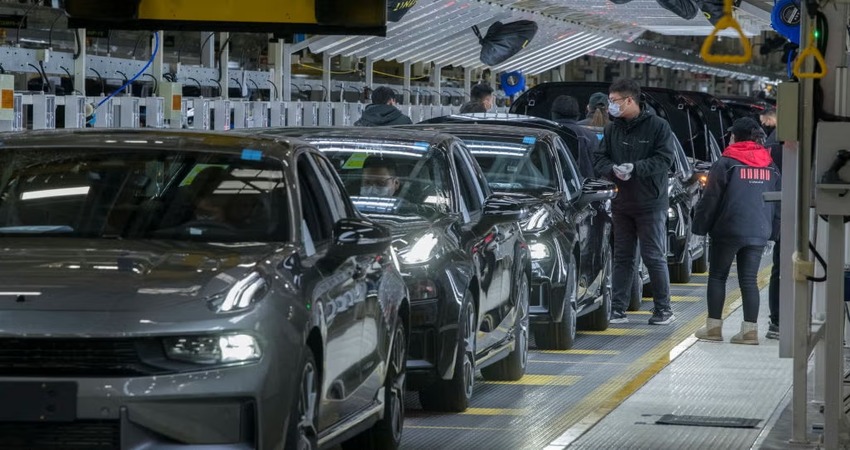Federal officials acknowledged that few Chinese vehicles are now on American roads, but said the administration wants to take proactive steps to strengthen national security.
The Biden administration announced a major move on Monday to ban Chinese-made software from internet-connected cars in the United States, justifying the move on national security grounds. The move is intended to prevent Chinese intelligence agencies from monitoring the movements of Americans or using vehicle electronics as conduits to the U.S. electric grid or other critical infrastructure.
The move, likely the last major cutoff of Chinese products in the United States under the Biden administration, follows the same logic that resulted in a ban on Huawei telecommunications equipment and an investigation into Chinese-made cranes operating at U.S. ports. turned out
Combined with efforts by Congress to force TikTok to sever ties with its Chinese owners, the move is a major boost to the administration’s efforts to address what it sees as major cyber threats to the United States. . But the effort has, in fact, begun to tear down a digital iron curtain between the world’s two largest economies, which just two decades ago were proclaiming that the Internet would bind them together.
Briefing reporters, administration officials said that national security concerns, rather than politics, led the Commerce Department to propose the ban, which officials say could happen before President Biden leaves office on Jan. 20. This will be made a permanent rule. This year, Mr. Biden announced a 100 percent tariff on Chinese electric vehicles, saying they were heavily subsidized in China. The announcement was notable because such cars had barely begun to enter the US market – and Mr Biden clearly pitched it as a way to keep jobs in the US.

“Many of these technologies collect large amounts of information about drivers,” Jack Sullivan, Mr. Biden’s national security adviser, told reporters on Sunday. They are constantly connected to personal devices, to other cars, to critical U.S. infrastructure, and even to the original manufacturers of vehicles and components.
He added: “And for that reason, connected vehicles and the technology they use bring new risks and dangers, especially in the case of vehicles or components manufactured in the P.R.C. and other countries of concern.” He said using the initials of the People’s Republic of China.
Mr. Sullivan cited U.S. concerns about Typhoon Volt, which U.S. intelligence officials and the F.B.I. This is a Chinese attempt to inject code into US power systems, water pipelines and other critical infrastructure. U.S. officials fear that in times of crisis — for example, a Chinese attempt to seize Taiwan — the code could be deployed to cripple U.S. military bases, slowing their response.
While they are evaluating other industries that could be subject to software and hardware rules proposed for the Chinese auto industry, officials said none of them would be covered by the Chinese automotive ban.
Countering real and perceived Chinese threats is one of the few issues that has garnered support from both Democrats and Republicans, though many China experts believe fears of Beijing have gone too far — And that American consumers are also suffering. Still, whether former President Donald J. Trump is returned to the Oval Office or Vice President Kamala Harris is elected, experts believe an expanded list of banned Chinese imports—and restrictions on what kind—will be needed by Beijing. Chips and software can be exported. Most likely it will only accelerate.
Richard Fontaine, chief executive of the Center for a New American Security and author of the recently published book “The Lost Decade: The US Pivot to Asia and the Rise of Chinese Power,” said in an interview that the move is an extension of is US attempt to build a “high fence around a small yard” of strategically important goods.
“On China Tech, it’s clear that the ‘small yard’ is growing in size and will continue no matter who wins the election in November,” Mr. Fontaine said. “Policymakers of all stripes are increasingly worried about the national security risks inherent in Chinese technology, especially when they imagine what could happen in a conflict.”
Under the proposed rule, Russian software would also be included — even though the Russians produce almost nothing that could be banned.
“The precedent is important, and I think it just reflects the complexities of a world where many connected devices can be weaponized,” said Brad Satser, a senior fellow at the Council on Foreign Relations. “The security competition and rivalry between the US and China is increasing. So, certainly, there is a possibility that this precedent could spread over time.”
Peter Harrell, who was previously the National Security Council’s senior director of international economics during the Biden administration, said federal officials could test Chinese-made drones, which pose similar surveillance and security risks.
Although he said he did not believe the Biden administration would be able to accomplish much before Mr. Biden’s term ends, he said the country “will likely see a continuation of that under either Trump or Harris Will.”
The proposed ban will apply to all-wheeled vehicles plying on the road, including cars, trucks and buses. This would not include vehicles not used on public roads, such as for agriculture or mining.
A ban on software of Chinese or Russian origin in connected and autonomous vehicles will begin in model year 2027. The proposed rule would also ban hardware integrated into vehicle connectivity systems starting in model year 2030.
Gina Raimondo, the commerce secretary, acknowledged that there are now few Chinese or Russian vehicles on American roads, but said the administration wants to “take proactive steps to protect the American people, including our children, from potential surveillance.”
Ms Raimondo said foreign adversaries could use their software in connected vehicles to collect data on where drivers live and where their children go to school, among other things. In an extreme situation, a foreign adversary could shut down or take control of all its vehicles operating in the United States, a move that could lead to accidents and blocked roads, Ms. Raimondo said.
“This is not about trade or economic gain,” Ms. Raimondo said on a call with reporters on Sunday. “This is strictly a national security action.”
The proposed rule comes after Mr. Biden ordered the Commerce Department in February to launch an investigation into the threat of technology embedded in Chinese vehicles.
It also follows moves by the Biden administration to curb imports of Chinese cars, which officials fear could hurt the administration’s efforts to boost domestic manufacturing of clean energy products. is
In May, the Biden administration quadrupled tariffs on Chinese electric vehicles to 100 percent, an effort aimed at banning the costlier vehicles and protecting U.S. automakers that receive billions in federal subsidies. are ready for The federal government is offering lucrative tax credits and subsidies to companies as incentives to install more electric vehicle, solar and wind projects. The initiative is expected to cost hundreds of billions of dollars over the next decade.




order generic amoxil – cheap amoxil sale amoxicillin pills